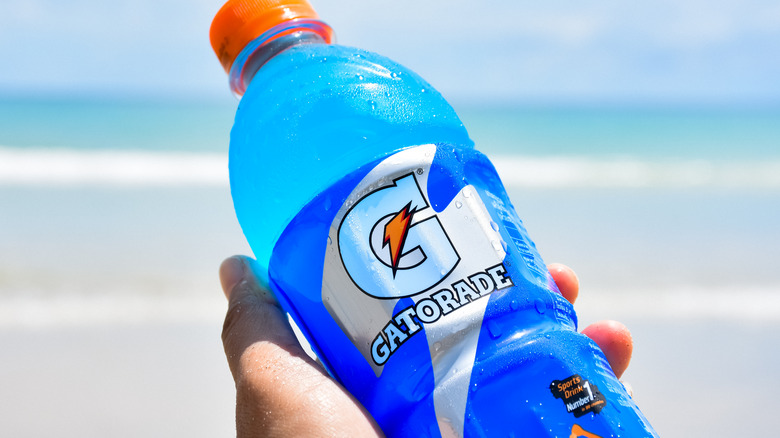If You're Not Losing Belly Fat, This Could Be Why
Everyone has different body types, with the propensity to hold on to stubborn body fat in different locations. Belly fat in particular is often demonized in the media and in #gymlife culture.
Belly fat can negatively impact your overall health. Excess fat surrounding the abdomen can increase your risk of developing diabetes, heart disease, and cancer, which is obviously not great. Unfortunately, people with excess fat around the abdomen (an "apple-shaped" body) are generally regarded as less healthy than those who hold their weight in their hips and thighs (a "pear-shaped" body).
If you want to shed belly fat for health purposes, go you. However, a few stubborn pounds lingering around your midsection are unlikely to truly increase your risk of developing these life-altering diseases. Just because the media tells us that we should have perfectly flat stomachs doesn't mean that this is reality. In fact, perfectly flat stomachs are not the norm for most people, especially for women (via Cosmopolitan). If you have been on a mission to shed stubborn belly fat but seem to have hit a plateau, there are a few common missteps that you may be making.
You often reach for processed foods
Even if you are super, profoundly, and epically motivated to drop some belly fat, sometimes convenience wins out and you end up reaching for processed foods. Fear not, as this is a trap that even the best of us fall into. However, if you think that your processed foods habit might be inhibiting your ability to tighten your tummy, you're likely right — and it may be time to take a closer look.
Processed foods are often low in fiber and high in trans fats, saturated fats, and sugar, all of which can contribute to the stubbornness of your belly fat (via Healthline). Generally speaking, processed foods often contain high amounts of refined carbohydrates, which have effectively had the naturally-fibrous components removed. Diets that are loaded with refined carbs have been linked to lessened satiety after eating and weight gain, specifically in the abdomen. Subbing in fresher, fiber-full foods in lieu of convenient processed options is one way that you can start super-charging your belly fat-burning ability.
You rely on sports and energy drinks
Sports drinks can be exceptionally deceiving. This is especially true if you are pumping iron day in and day out, replenishing with a Gatorade, yet still befuddled as to why your belly fat won't budge.
For the non-elite among us, opting for sports drinks after workouts could be sabotaging your weight loss efforts in a big way. For example, one serving of original Gatorade contains 36 grams of sugar (via Gatorade). While Gatorade does contain electrolytes, the pros of consuming them in this uber-sweetened form do not outweigh the cons. For context, a 12-ounce serving of Coca-Cola contains 39 grams of sugar, according to their website. 36 grams of sugar is equal to around 9 teaspoons, which is the upper limit of what is recommended for men to consume daily. The recommendation for women maxes out at 24 grams, or 6 teaspoons per day (per the American Heart Association).
It turns out that energy drinks and sports drinks that are artificially sweetened aren't much better. Some artificial sweeteners inhibit the body's natural inclination to regulate the intake of sugar and calories, which can lead to overconsumption. Overconsumption can in turn lead to excess belly fat, especially if that is where your body prefers to hold its fat stores (via WebMD).
Your fat consumption is imbalanced
Unsurprisingly, fat consumption is tethered to belly fat retention, but not exactly in the way you might think. What you have heard is true: Not all fats are created equal. To expand upon this, some contribute to your belly bulge while others are associated with positive health effects.
Omega-3 fatty acids, other polyunsaturated fats, and monounsaturated fats are the healthiest to consume. This is the kind of fat that is commonly found in salmon and other fish, avocados, and walnuts. These "good" fats have been known to help decrease inflammatory conditions in the body and aid in overall health. Conversely, saturated fat, which is found in animal products, has been linked to higher levels of visceral fat. Visceral fat is the type of fat that is stored in your abdomen and serves as a cushion for your internal organs. However, too much of this cushioning can lead to a bulging belly (via Time).
Since fat is more calorically dense than carbs and protein (the other macronutrients), calories from fat can add up rather quickly (per Heuser Health). With this in mind, eating too much of even the healthy fats can lead to weight gain.
Your workouts aren't challenging enough
If you are putting in hours at the gym and are feeling frustrated that your belly fat persists, we are sorry for what we are about to tell you. Often, if you are not seeing the physical results you desire, it could be caused by a lack of intensity. Simply put, your workouts might not be hard enough. While doing something active every day is better than not doing anything active, going through the motions alone is not enough.
Working out to the best of your ability can supercharge the calories burned during exercise and ultimately increase your metabolic function over the long term. The higher your workout intensity, the more bang for your buck, really. High-intensity exercise does not have to be intimidating, though. Find an intensity that works for you. Armed with the knowledge that those who exercise at a high intensity lose belly fat faster than those who work out at a low threshold, you can plan your workouts accordingly and start to see changes more quickly (via Time).
You are doing the wrong kinds of workouts
Though the intensity of the workouts you are executing definitely matters, the kind of workout you are doing also matters.
If you are not seeing results when it comes to dropping belly fat, the type of workouts you are performing might need to get changed up. For example, if you are doing sit-ups day in and day out, anxiously awaiting the day when your six-pack abs will make their debut, you are likely to be disappointed. It is impossible to "spot-reduce" fat, which is one of the reasons why this method is completely ineffective.
Instead of just crunching your life away and being discouraged, you can add in more dynamic movements that incorporate larger muscle groups. The more muscle you use in each movement, the greater the metabolic gain. Furthermore, just engaging in cardio exercise is an ineffective way to banish belly fat. Yes, cardio exercises like spin class and running can offer great health benefits, but to reap the fullest benefit of belly fat loss, it is paramount that your workouts are well-rounded and intense. Building muscle while maintaining your cardiovascular health is the best way to start seeing changes in your waistline (via Time).
Your hormones are in chaos
While you can slightly influence your hormones, this is mostly a component of belly fat loss that you don't have a ton of control over. Unlike tailoring your workouts to emphasize fat burning or modifying your diet, the delicate balance of hormones within your body is much harder to nail down. The levels of estrogen in a female body change with age, and these changes can often be accompanied by mild insulin resistance(via Prevention). If the body becomes insulin-resistant, they are more likely to hold on to weight, especially in the belly.
Insulin imbalances can affect leptin, which is the hormone that signals the feeling of fullness. A leptin imbalance is likely to lead to overeating because your body fails to send the signal to tell your brain to stop eating. Mood swings, stress, and insomnia can all signal a hormone imbalance that might be leading to your body's desire to hold on to belly weight as well. If you suspect that a hormone imbalance is to blame, it is best to check in with your doctor to determine what your best treatment options might be.
You aren't sleeping enough
We all know that sleep is good for us, but as the demands of life mount, it can be really difficult to prioritize sleep. After all, we can't exactly be productive while we sleep and our to-do lists are a mile long. Failing to get adequate rest can inhibit our abilities to make sound decisions. If you don't get enough sleep, you might end up hitting the snooze button and swinging by Starbucks for breakfast instead of making something healthy at home. You might feel too fatigued to cook dinner or get any exercise, which can become habitual if you exist in a state of exhaustion day after day (via WebMD). Of course, we are all susceptible to days like this here and there. It is the recurring patterns of these behaviors that can lead to expansion of the waistline variety.
Not getting enough sleep can also trigger an outpouring of cortisol. Cortisol is a stress hormone that encourages your body to hold on to fat. Insulin is also affected by a lack of sleep. When your insulin levels get messed up because you didn't rest up, your body has a tougher time processing fats in the bloodstream and ends up holding on to them as fat. Ultimately, your tummy will thank you for turning in a bit earlier every night.
You drink too much alcohol
You probably knew this one was coming. I mean, they don't call it a '"beer belly" for no reason. Alcohol consumption, especially in excess, has a hard-won reputation for packing on gut weight. Since the calories in alcohol do not fit into the parameters of the standard macronutrients (fats, carbs, and protein), calories consumed from alcohol are processed differently. The other macronutrients all have jobs to perform on a cellular level, but calories from alcohol do not. Therefore, our metabolism takes on alcohol calories first, since there is not a convenient place to stash them for later use or disposal.
Since our metabolic function is focused on removing alcohol from our systems when we drink, that becomes the priority. Thus, processing calories consumed from other sources, even healthy ones, gets bumped down on the list of biological priorities. It also doesn't hurt us all to remember that booze often contains more calories than we think. Little by little, these calories can add up and sabotage our weight loss efforts (via Time).
Your life is stressful
Day-to-day life can feel stressful. Unfortunately, stress is another factor that can bring down your belly fat loss efforts. It is not the source of the stress itself that is to blame, but the physiological processing that goes on within our bodies. Stress increases our levels of cortisol, a stress hormone. Cortisol is released by our adrenal glands when we experience stress (via Healthline). Biologically speaking, cortisol came in handy when our ancestors had to run away from lions. Nowadays, we are not doing a ton of running away from big cats, but the stress response in our bodies behaves similarly.
Chronically high levels of cortisol can lead to an increase in visceral fat, which can then lead to heightened levels of cortisol. Excess levels of cortisol can also lead us to reaching for comfort foods, typically those that are high in fat and sugar. Foods like these can technically provide immediate energy if we need it in order to outrun a lion, but without a lion breathing down our necks, our body is more likely to hold on to the calories we consume than utilize them. Stress management techniques are often the best way to avoid getting caught in this perpetual cycle of elevated cortisol.
You are aging
Unfortunately, struggling to lose belly fat might just be a sign that we are aging. As we age, so do our metabolic rates. This happens among men and women, and can change the way our bodies react to excess calories and exercise. Weight gain can sneak up on us if we continue to eat the same way we did in our 20s. Simply put, our caloric needs change — and if we over-feed our systems, this extra energy gets stored as fat, often in our midsections.
Our hormone levels naturally decline as we age, too. The decrease in sex hormones in both men and women can affect our metabolic rates. Menopause, specifically, can cause women to stash more cushion around their tummies (via Time). The decline in estrogen changes our bodies' abilities to distribute fat, which often causes it to accumulate around the midsection, hips, and thighs. Furthermore, our muscle mass tends to naturally decline as we age. Muscle demands more of the metabolism than fat does, thus allowing our bodies to lower metabolic function (via Cosmopolitan).
You smoke
If you are a smoker, we hate to burst your bubble (again). It seems like smoking's negative effects trickle into every aspect of life, including whether or not you are able to disappear stubborn belly fat. If you are a smoker, there is a bit of a silver lining, though — the effects of smoking on belly fat seem to be more prevalent in heavy smokers than in light or moderate smokers.
WebMD states, "Scientists say that while people who light up may have better control of their overall weight, heavy tobacco use tends to push fat into central areas, resulting in a protruding tummy." Even though many people who smoke have lower BMIs, their waist circumference tends to be higher because smoking appears to push fat stores into the stomach. A bigger waist circumference has been linked with certain diseases, including diabetes, which is an additional reason why this is cause for concern.
You aren't drinking enough water
Water is the nectar of life, as we all very well know. While most of us struggle to get enough water in every day, doing so might help us shed the belly fat that we haven't gotten to budge yet.
Our body needs water on a cellular level, and failing to consume enough can ignite reactions that won't serve us when it comes to weight loss. Namely, dehydration can affect our ability to burn fat, which obviously will increase the amount of belly fat our bodies cling on to (via LiveStrong).
Beyond that, though, dehydration can slow our metabolic rate in an effort to conserve water, while also subtly encouraging us to overindulge in high-calorie foods. Dehydration also impacts the delicate balance of hormones within our body, including insulin and testosterone, which can lead to our tummies holding on to extra cushion. Simply increasing your daily water intake is a great way to combat these negative effects (per LiveStrong).
You are genetically predisposed to carry weight in your belly
While some of the reasons why you might not be losing belly fat are well within the parameters of what you can control, others are not. Unfortunately, a genetic predisposition to holding weight in your belly is not something you can control. You can, however, work within your genetic guidelines to build a physique that you are comfortable with.
Many of the lifestyle changes that can help you shed belly fat can be applied as principles for overall weight management and health as well. Genetics are a huge predictor of obesity, and where your body stores fat is also thought to be determined by way of genetics.
While research is ongoing, there is some evidence to link certain genes with the efficacy of specific hormones. For example, some genes may have an influence over leptin, the hormone that allows our body to tell our brain that we are full. More research needs to emerge before these links are fully understood and explained, though (via Healthline).
You are a woman
Much like your genetic predisposition, being a woman is not something that can be changed at the drop of a hat. Make no mistake, though. Being a woman is wonderful; just ask Shania Twain. That said, her song definitely does not mention the fact that women are more likely to live with persistent belly fat than men.
Not only do women tend to have around 6% to 11% more body fat than men, but women also have lower metabolic rates (via Cosmopolitan). This is why men can eat so much more without gaining an ounce, and also why some tend to drink far more than women. If you are a woman, your lower metabolic rate essentially means that your body requires less energy to carry out daily functions when compared to men's bodies. (Proving what every woman has always known, of course, about men being more high-maintenance than they'd admit).
Women are also thought to hold more weight around the midsection to prep for childbearing. This kind of seems like a slap in the face, as once a woman's childbearing years are over, her estrogen supply decreases (which further decreases her metabolic rate).















